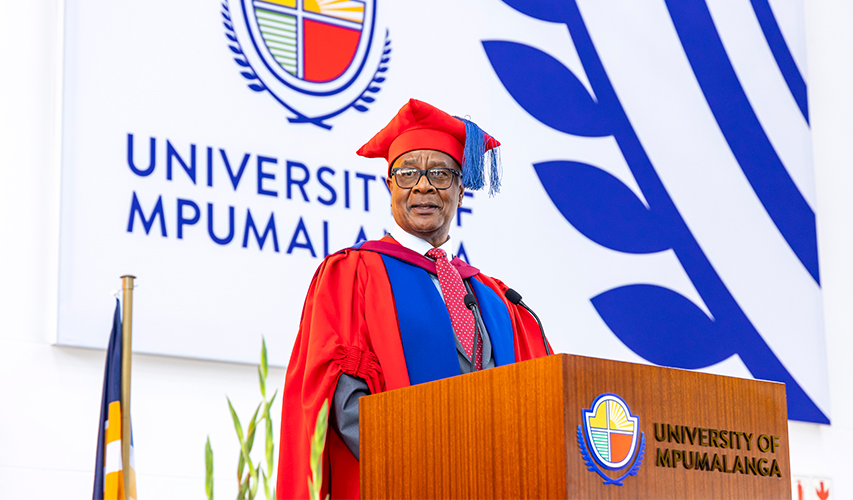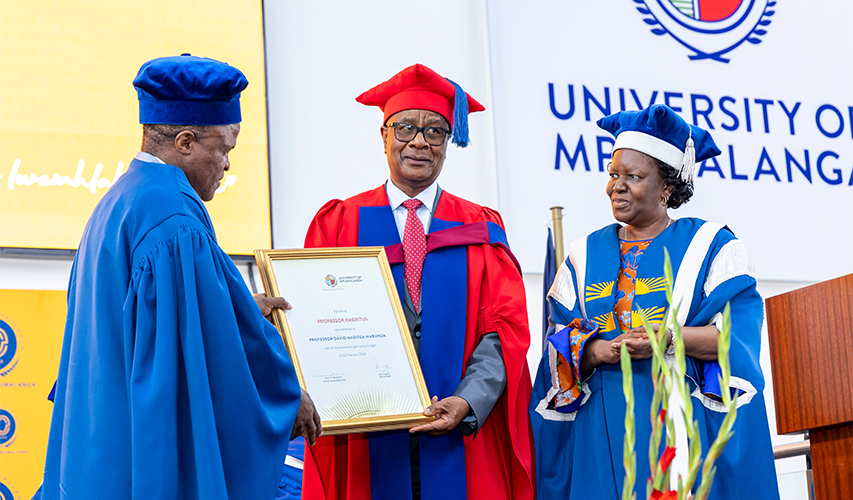UMP was established in 2013 and enrolled the first cohort of 169 students in February 2014 in three programmes, namely Bachelor of Education (Foundation Phase Teaching), Bachelor of Agriculture in Agricultural Extension and Rural Resource Development, and Diploma in ICT.
Since its inception, UMP has carved an impressive path marked by notable milestones. Among these achievements stands the establishment of the Faculty of Agriculture and Natural Sciences in 2016, followed by the momentous occasion of its inaugural Graduation Ceremony in 2017.
Professor Mabunda shares his insights on UMP’s path to growth and the steps that were needed to ensure its success.
Where and how did it all begin?
"The idea of establishing a university in Mpumalanga was first put forth by the Chief Minister of the KaNgwane Homeland at that time, Dr Nganani Enos John Mabuza, when his government founded the Elijah Mango College of Higher Education as a precursor to a fully fledged university in the then Eastern Transvaal.
In the early 1990s, local academics, including individuals such as Mr SS Mahlalela, Dr Mangena William Ndlala, Professor John Shongwe, Mr Irvin Phenyane, Mr Joe Magagula, Professor Selby Ripinga, Mr Martin Mchunu, former Deputy President of the RSA Mr DD Mabuza, and myself as a leader of the University Committee, spearheaded the push to establish a university in Mpumalanga. Collaborating with a similar committee from the Northern Cape, we jointly advocated for the establishment of universities in both provinces to post-1994 administrations.
Despite several unsuccessful attempts with the Mandela and Mbeki administrations, the Zuma administration finally approved the establishment of both the University of Mpumalanga and Sol Plaatjie University in the Northern Cape in 2013. This marked the culmination of a 24-year-long struggle for higher education provision in these two provinces, which had been previously neglected by the apartheid government.
Mr DD Mabuza played a pivotal role in convincing the Provincial Department of Agriculture to incorporate the Lowveld Agricultural College into UMP and persuaded the Shongwe Family to relinquish their successful land claim on the site where the university stands today. The rest, as they say, is history."
 Professor Mabunda delivered the inaugural Dr Enos Mabuza Public Lecture at the ceremony to celebrate 10 years of UMP Academic Activities.
Professor Mabunda delivered the inaugural Dr Enos Mabuza Public Lecture at the ceremony to celebrate 10 years of UMP Academic Activities.
Being the Chairperson on the Council of a new University in a province where there is no other institution and no framework, what were the guiding principles for ensuring the success of the University?
"The Department of Higher Education provided the generic policy framework that guides new councils in creating policies to run a university. These general guidelines are not institution-specific but generic and require customization to fit the needs, aspirations, and local conditions of an institution.
The Interim Council had both governance and executive powers to create policies, establish an organogram, and appoint staff. Having had the privilege of creating institutional arrangements in the post-1994 dispensation for the Mpumalanga Department of Education and the Mpumalanga Tourism and Parks Authority, I advised the Interim Council not to rush with the appointment of permanent staff in a vacuum. Instead, we appointed a Strategic Management Team headed by the late Professor Andy Mokgotloane (former University of Pretoria DVC), Professor John P Shongwe, and Mr Sandile Mabuza to start the nucleus core team of creating this new university.
We also had seasoned academics and leaders in our Interim Council, such as Prof Chris de Beer (former VC at Sefako Makgatho University), the late Prof Connie Mokgadi, Mr Fidel Mlombo, people of high integrity in the higher education space and community.
The Interim Council was dissolved when the permanent council was established, which in turn appointed the first Vice-Chancellor of the University, the successful Prof Mayekiso, who is a distinguished scholar and higher education administrator with more than 30 years of experience."
The journey to success indeed presented its challenges. What motivated you, as well as other Council members and UMP Management, to persevere despite the obstacles?
"We encountered both warm and hostile reception from various stakeholders of the University. Within the Provincial Government, some believed that the university should take instructions from the Provincial Department of Education, while in other quarters, sections of the local construction business voiced grievances over tenders, leading marches to destabilise the university and demanding 30% of the value of each building on behalf of emerging sub-contractors.
The Interim Council refused to yield to unreasonable pressures and instead focused on building healthy community relations. Professor Shongwe, in his role as Stakeholder Liaison Manager, performed admirably in fostering positive stakeholder relationships throughout the province. We were able to persuade both allies and adversaries that UMP could only thrive with the full support of the entire community, and its success would be a source of pride for all the people of the region, the country, and the continent.
Integrity, honesty, mutual respect, and the ability to listen to people’s concerns were the cornerstones of our success. Subsequently, we appointed a Vice-Chancellor who was both gentle yet resolute in decision-making. Professor Mayekiso understood that her role was not to seek popularity but to make sound decisions in the best interest of the university. She did not yield to unreasonable pressure exerted by key stakeholders such as labour, students, and the taxi industry."
 Professor Mabunda was conferred with the title Emeritus. Presenting the award was UMP Registrar Mr Sello Legodi and Vice-Chancellor, Professor Thoko Mayekiso.
Professor Mabunda was conferred with the title Emeritus. Presenting the award was UMP Registrar Mr Sello Legodi and Vice-Chancellor, Professor Thoko Mayekiso.
If you were to revisit the same role, what changes would you consider making?
"I would approach 99% of tasks in the same manner as before, but I might focus on ensuring that the working population in the vicinity of Mbombela and other major centres in the province have access to part-time studies for diplomas and degrees through face-to-face teaching.
A significant portion of the population in this province was deprived of the chance to pursue higher education due to the absence of a university. Many would eagerly seize the opportunity to study. It would be a remarkable milestone for UMP to witness individuals from various walks of life, such as mineworkers, taxi drivers, domestic workers, or cattle herders, ascending the stage to be conferred degrees by our Chancellor."
You have a special relationship with the University, tell us more.
"I didn't have the chance to pursue my university studies here in Mbombela because we didn't have a university. It was always my aspiration that my children and the next generation of our province wouldn't endure the same challenges of being stranded far from home when funds ran low or unexpected campus events forced us to find temporary shelter, like sleeping on the benches of railway stations, waiting for the next train to take us home in 24 or 36 hours.
These experiences inspired me to engage in the effort to establish a university in our local area.
My association with the University began when it was merely a concept, and we were advocating for its establishment back in 1989. The idea took shape over 24 years before the university was finally founded in 2013. In total, I've been involved with this university for 34 years to date. UMP is not just an institution to me; it's something I dream, live, breathe, talk, and walk."
Interview by Lisa Thabethe. Pictures supplied.